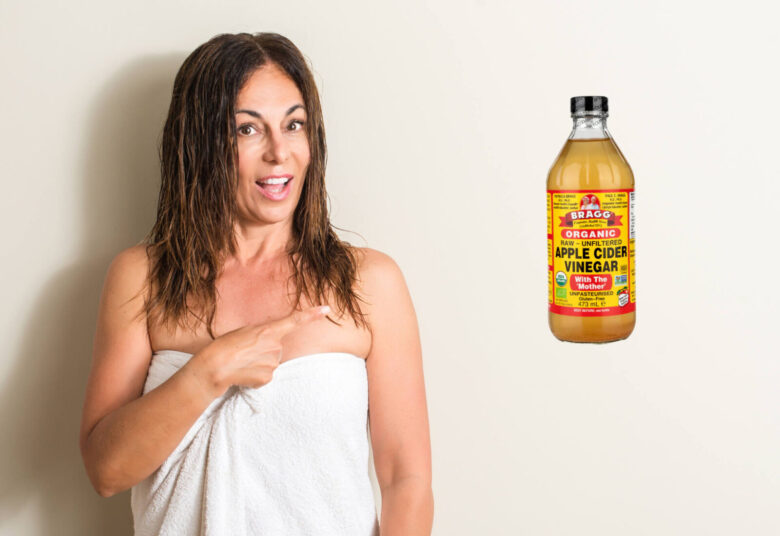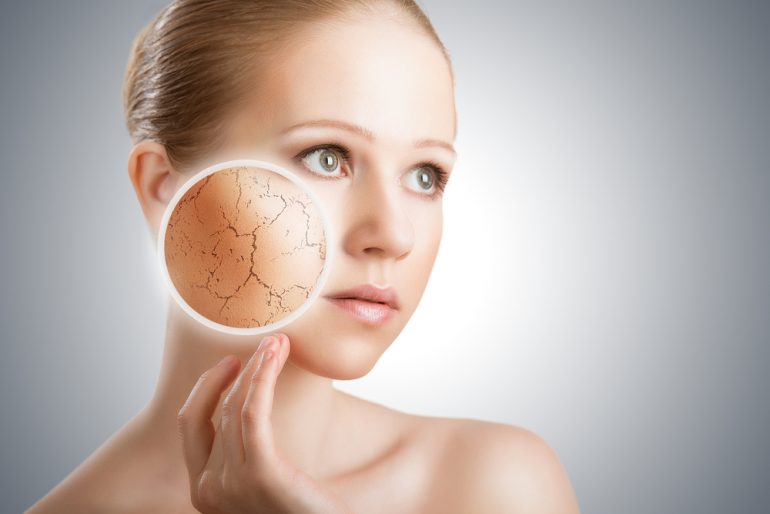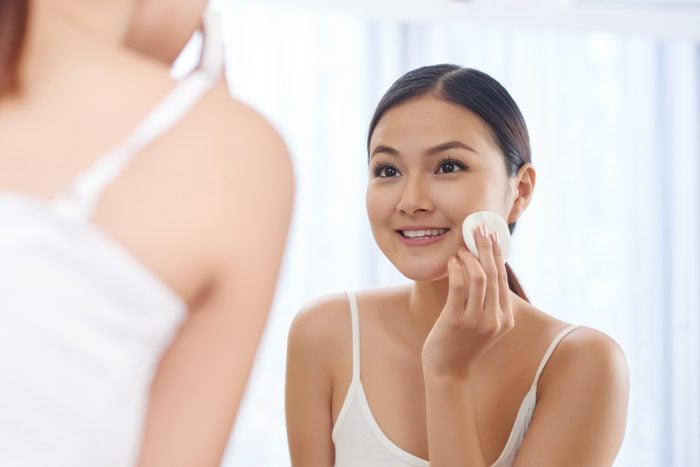The purported benefits of apple cider vinegar are the stuff of news headlines and social media posts. There are thousands of claims that this liquid concoction of mashed apples, yeast, and sugar can cure whatever ails you.
Controlling acid reflux, lowering blood sugar, and suppressing appetite are a few benefits some people extol. Of course, it’s also beneficial for food preservation and a useful antibacterial cleaning agent. Plus, it makes a mean but healthy salad dressing.
But can apple cider vinegar benefit your beauty regimen? Clear scientific evidence of the benefits of ACV is virtually non-existent because many studies have yet to be conducted. However, there’s a healthy dose of anecdotal evidence that it can work magic in many ways. Here are four beauty benefits you might want to explore.
1. ACV Could Give You Prettier Skin

If you have oily skin and are prone to acne breakouts, a little ACV might balance your skin’s pH. That’s not surprising since pH, or “potential for hydrogen” is all about acidity. If there’s one ingredient that’s acidic, it’s vinegar.
You should also know that the gut microbiome is connected to the skin microbiome. Microbiomes comprise an assembly of microorganisms — some good, some bad. According to Numo’s website, the fermented part of ACV, the “mother,” is linked to metabolism and immune system support. It can also deter inflammation, facilitate proper breakdown of vitamins and minerals, and boost antioxidants.
The root of certain skin conditions, including dermatitis, psoriasis, dandruff, and acne caused by inflammatory disorders may lie in the gut. So, if you have a healthy gut, you often also have healthy skin.
If you suffer from sensitive skin or skin disorders, you should talk to your dermatologist about trying ACV. Moreover, ACV should be properly diluted with water if used directly on the skin. But it could be the best — and least expensive — skin toner ever.
2. ACV May Give Your Mane a Boost

You combine ACV and oil to make a salad dressing that’s rich, tart, and sweet all at once. This recipe seems counterintuitive to ACV’s ability to reduce oil on our scalp or skin. But the vinegar’s acetic acid can strip excess oil and product buildup in your hair. At the same time, it may also help treat dandruff.
Again, unless it’s used in good measure, you could do more harm than good by adding ACV to your routine. Talk to your doctor first if you have a skin condition. If you don’t have an oily scalp or dandruff, you might not want to use it all. Or you can look for bottled ACV shampoos and conditioners that may provide some of the benefits with less acidity.
Figuring out the proper ratio of vinegar to water to use as a hair rinse may take a little time. Start with a recipe using only a little vinegar and work up as necessary. Use sparingly. Rinsing with the mixture once or twice a week is probably enough.
Plus, although you won’t find ACV on most lists of products that increase hair growth, some people report that it does. So, while you’re giving yourself a fuller, shinier, head of hair, you might also be adding a few more strands.
3. ACV Can Make You Smell Better

The human body is covered in bacteria. When that bacterium comes into contact with wet, salty, oily sweat, it starts to smell. Feet, armpits, and genital areas are prime sweat traps. Acetic acid kills harmful bacteria and ACV contains acetic acid. You can see where this is going.
If you suffer from foot odor, there are several home remedies and medications you can try to neutralize it. But since ACV is inexpensive and easy to obtain, you might want to give it a whirl. Add 1/3 cup of ACV to a gallon of water, soak your feet, and repeat as needed.
You can also use it to eliminate the bacteria that cause smelly armpits. Some soaps contain ACV. But if you want to try it full-on, just dilute it, put some on a cotton ball, and swipe your pits with it. Remember, that it’s the acid that works on bacteria, so beware shaving before you apply it.
There are some sources that recommend adding ACV to a bath to cleanse vaginal bacteria. But there are just as many, if not more, who warn against it. ACV can alter the delicate balance of vaginal bacteria and pH and do more harm than good. For anyone dealing with genital odor, ACV should be external use only. And perform a patch test on a small area of your skin to check for any adverse reactions or sensitivity before applying anywhere.
4. ACV Can Slough Off Dead Skin Cells

You know that the secret to radiant, healthy-looking skin is removing the dead skin cells that dull it. ACV may be able to with your exfoliation routine on two fronts. First, it can help remove those cells and second, it can keep your loofah clean.
The acid in ACV is a natural chemical exfoliator, lifting off those dead skin cells to reveal a healthy glow. Once again, using ACV in full strength can cause damage, so always dilute it. You can dilute it in a basin of water then put your washcloth or loofah in to apply it to your skin.
Because your loofah touches your skin and all its bacteria, it needs some attention too. Luckily, you can use ACV to keep it clean and fresh. Just add one part ACV to two parts water and let the loofah soak in it for about an hour. Rinse it under running water and it’s ready for its next use.
Your skin-cell turnover rate decreases as you get older. Old cells hang around and accumulate, which is why you lose that youthful glow. If you want to get it back, ACV might be the solution for your problem.
Is Beauty Only Skin Deep?

They say that beauty is only skin deep, but apple cider vinegar may help you stay beautiful inside and out. Consume those ACV gummies to keep everything inside in balance and use the diluted liquid to make your outside appearance glow. Beauty just may be in the hand of the ACV holder.

